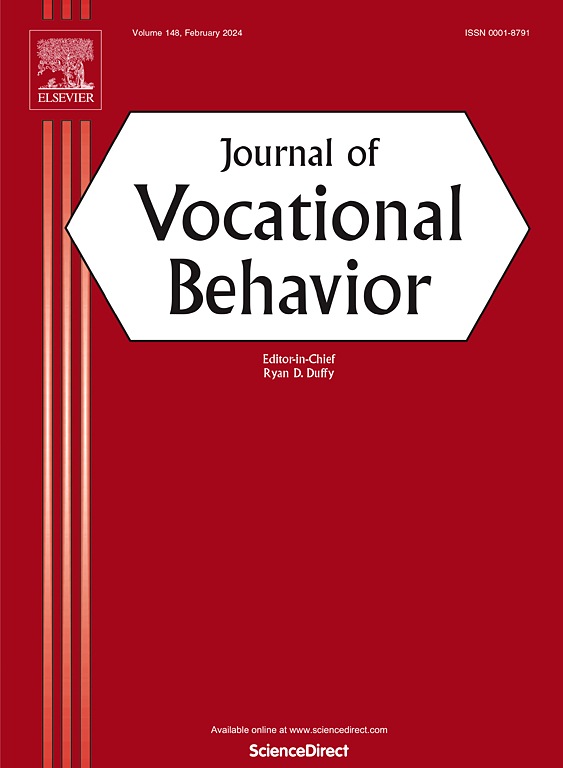平均学分绩点对日后的职业成功有长期影响吗?从青春期到职业生涯中期的资源大篷车视角
IF 5.2
1区 心理学
Q1 PSYCHOLOGY, APPLIED
引用次数: 0
摘要
我们从 "资源大篷车 "的角度来解释纵向样本(涵盖职业生涯的前 15 年)中职业成功的途径。通过应用潜增长模型,我们研究了大学平均学分绩点(GPA)对职业成功的作用如何随时间而变化。潜增长曲线分析的结果表明,GPA 与最初的职业成功水平(即薪酬和领导级别)并不呈正相关,但是,GPA 与随着时间推移职业成功的增加呈正相关,并且与主观职业成功呈正相关。这些发现表明,GPA 对职业成功的积极影响是随着时间的推移而积累的,这与资源保护理论中的资源大篷车和收益螺旋是一致的。此外,我们还研究了在大学学习之初测量的 GPA 和情感认同领导动机(MTL)在解释职业成功率随时间增长的共同作用。正如预期的那样,情感认同MTL调节了GPA与领导水平、薪资水平和主观职业成功之间的关系,因此情感认同MTL较高的个体的正相关关系更强。我们的研究结果突出表明,通往职业成功的道路是以收益螺旋为基础的,随着时间的推移,个人在其资源大篷车中积累的资源可能会缓慢发展,并进一步投资这些资源以实现其职业成果。本文还讨论了对实践的启示。本文章由计算机程序翻译,如有差异,请以英文原文为准。
Does grade point average have a long-lasting impact on career success later in life? A resource caravans' perspective from adolescence to mid-career
We draw on a resource caravans' perspective to explain pathways to career success among a longitudinal sample, covering the first 15 years of their careers. By applying a latent growth model, we investigate how the role of university grade point average (GPA) on career success changes across time. The results from latent growth curve analysis revealed that GPA was not positively related to initial levels of career success (i.e., salary and leadership level), however, GPA was positively related to increases in career success over time and positively related to subjective career success. These findings indicate that the positive impact of GPA on career success accumulates over time, in line with the resource caravans and gain spirals of conservation of resources theory. Further, we examine the joint role of GPA and affective-identity motivation to lead (MTL) measured at the start of university studies to explain growth in career success over time. As expected, affective identity MTL moderated the relationship between GPA and leadership level, salary level and subjective career success, such that the positive relationship was stronger for individuals higher on affective-identity MTL. Our findings highlight that the pathway to career success is based on gain spirals that may develop slowly over time as individuals accumulate resources in their resource caravan and invest these resources further to achieve their career outcomes. Implications for practice are discussed.
求助全文
通过发布文献求助,成功后即可免费获取论文全文。
去求助
来源期刊

Journal of Vocational Behavior
PSYCHOLOGY, APPLIED-
CiteScore
13.10
自引率
5.40%
发文量
85
期刊介绍:
The Journal of Vocational Behavior publishes original empirical and theoretical articles offering unique insights into the realms of career choice, career development, and work adjustment across the lifespan. These contributions are not only valuable for academic exploration but also find applications in counseling and career development programs across diverse sectors such as colleges, universities, business, industry, government, and the military.
The primary focus of the journal centers on individual decision-making regarding work and careers, prioritizing investigations into personal career choices rather than organizational or employer-level variables. Example topics encompass a broad range, from initial career choices (e.g., choice of major, initial work or organization selection, organizational attraction) to the development of a career, work transitions, work-family management, and attitudes within the workplace (such as work commitment, multiple role management, and turnover).
 求助内容:
求助内容: 应助结果提醒方式:
应助结果提醒方式:


